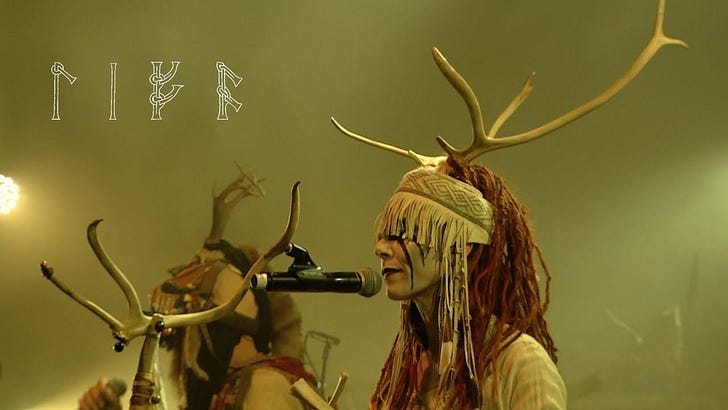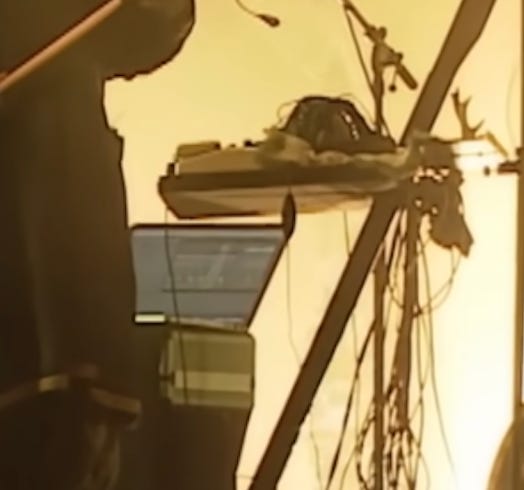The Heilung-MacBook Phenomenon
What a neopagan folk band teaches us about the experience industry - and modernity.
Modernity’s been on the mind recently. I’ve been going back and forth with a fellow GenZer friend who’s writing a piece on Russian dissident Aleksandr Solzhenitsyn’s damning indictment of the West as having ‘ceased to see the purpose’ and how, in many ways, our generation’s living out that dire prophecy in the clearest possible way, from increased levels of anxiety to crippling social media addiction. But halfway through that conversation, I started thinking about modernity, and the way in which we relate to our history through that modern lens.
It’s no new insight to note how a huge portion of the “experience industry” (think fine dining, concerts, conferences, etc) is designed around making us feel as if we’re either part of a social class we’re not actually part of (being at a dinner with think tank thought leaders doesn’t make you a thought leader - not even close) or giving us a sense of social cohesion that’s not all that authentic after the euphoria wears off (we can all sing along to the same song at a concert, but we’re all leaving in different cars once it’s over). On that note, I went on to YouTube to binge my evening away as is the norm because that’s how exciting my life is 48-50 weeks out of the year. Turns out, that ended up giving me a perfect example of modernity’s lens that I will now share with you. And as is typical for me, it involves some really avante-garde music.
A Band With Antlers
Enter the band Heilung (German for healing), an experimental folk group formed in Denmark in 2014. Heilung really doesn’t do concerts, per se. They produce what I think is best described as a Nordic Bronze Age immersive experience that somewhat involves music. The band wears animal pelt and antler-laden costumes on stage, with instrumentation ranging from a rattle made out of a buffalo horn to a horse skin drum painted with human blood. In case this is all a bit difficult to visualize, below is the first video I ever saw of a Heilung live performance.
Parts of the lyrics of the above song, Krigsgaldr, are essentially a musical rendition of one of the most prominent Norse runic inscriptions: the Eggja stone, dating to around 700AD. The song tells the story of shipwrecked Norse sailors seeking guidance from their deities as they battle mythical creatures to make it to shore. And honestly? I meant what I said about immersive. If you put on a good pair of headphones and go into a semi-meditative state (aka closing your eyes and not looking at your phone for 5 seconds), your mind’ll start to do things. In a strange way, and the comment section confirms this, it brings the listener into that Bronze Age world where dragons were thought to be real and bands of raiders traveled the seas in wooden ships under what they believed to be the blessings of the gods. And then you get to this moment.
Notice anything?
You may not realize this, but the Bronze Age Norse civilization was built on a complicated industry of fur trading, conquest, and MACBOOK PROS.
Now, I don’t bring this up to complain about bands that use computers live (that’s a dumb criticism). Go back to that point about the experience industry. The whole point of Heilung’s live show is to get the attendee out of their Western framework and into a headspace that matches the sonic space around them - that’s why they’re making music by hitting bones together and borrowing their lyrics from Norse mythos.
Bronze Age Simulation
But it’s not just an experience. It’s an experience industry. Everything about this attempt to reconnect humanity with its deeper civilizational roots is happening with the aid of some of the most cutting-edge technology the world has ever seen. And for what it’s worth, I don’t think that’s a bad thing. But it does merit thought.
It’s very popular to complain about social media and technology these days. “Social media’s terrible,” we say, as if the fault lay in the hardware and software of the iPhone and not in the people who use it to dopamine overload on Internet porn. The reality is that social media and technology are awesome, even the best, at what they do. So much so that, when it’s time to simulate the Bronze Age, we break out modern technology to make that experience more compelling and fulfilling. But, knowing that, is it more fulfilling?
Based on those verbalisms, you might think the answer would be no. And I’m sure there are some agrarian types who might argue the answer is no. But the answer is unequivocally, yes. 600AD, living after the fall of Rome in the wilds of Northern Europe, subject to savagery and oppression and starvation and the fact that there’s virtually no medicine that works efficiently, was a terrible time to live in almost every way imaginable. No matter how strong your sense of nostalgia is, you don’t seriously want to live there.
Modernity’s Lens - and Shield
The power of the technology we’ve created, of modernity’s lens, allows people to experience that history in literally the safest, cleanest, most viewer-friendly way possible. Most accurate? You don’t WANT it to be. There are lots of problems with technology and social media. But maybe let’s take a minute and appreciate the power of progress and the Internet to create a way for us to step into the most dangerous and chaotic parts of humanity’s past safely. That’s pretty awesome - and worth celebrating.
One last note about Heilung. A journalist wrote about the band, “Any attempt to link the band with or bring their music into a modern political or religious context is pointless, since HEILUNG try to connect their listeners with a time before the coming of Christianity and modern political ideologies.” Well, maybe. But that Macbook you’re using, and the technological and ideological impetus that spurred its creation and production, didn’t come from a bunch of antler-wearing pagans dancing around in a field chanting rune stone inscriptions. It took Christendom, a Reformation, and an Enlightenment to get there. You’re welcome.






